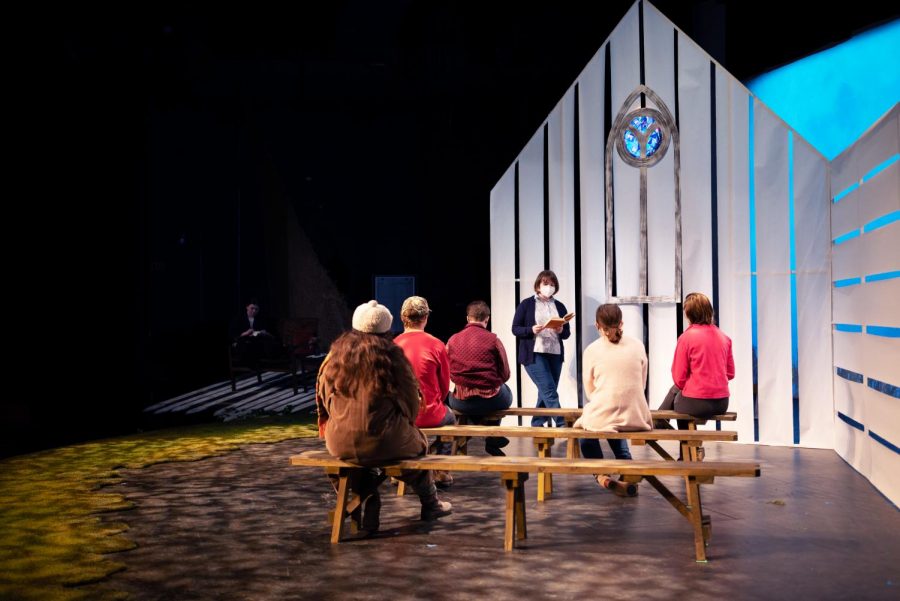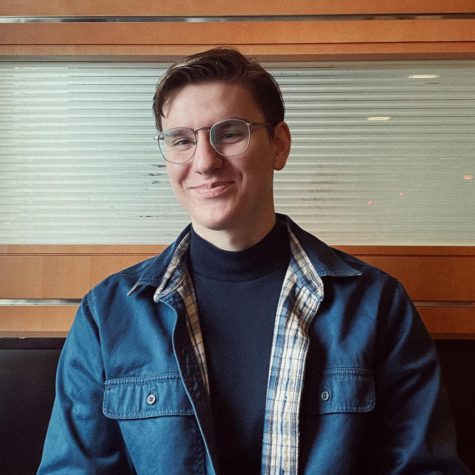Fear, faith and hope in “Arbor Falls”
“Arbor Falls” featured the work of guest designers Julia Corbett for sound and lighting and Quinn Legge for scenic and projection.
March 13, 2023
This past weekend, the Grinnell theatre, dance and performance studies (TDPS) department unveiled its interpretation of “Arbor Falls,” a poetic play written by Caridad Svich. The abstract work is a new part of Svich’s seven-play cycle entitled “American Psalm,” and through its immersive atmosphere and striking dialogue, it invites the audience to reflect on themes of community, spirituality, communication and change. This rendition is the second time ever that this show has been officially performed on stage.
The script leaves many choices up to the artists staging it — it is set in the small town of Arbor Falls, but it does not specify where this town is or when the events take place. Additionally, all but one of the characters are unnamed, and none of them have specified genders.
The plot revolves around the moral turmoil of a preacher in their small-town church. The style, feel and behavior of the church are reminiscent of Christianity, but with close attention to the language used in worship, it becomes clear that this church’s faith is something else — something unique.
The central conflict is introduced when a needy traveler comes into the town and begins attending the congregation. The townspeople are afraid of this outsider and begin to gossip. Jen Shook, director of the show and assistant professor of TDPS, said, “This is literal xenophobia. There’s nothing that makes them immediately visibly different than other people in the town, but they just aren’t known. They’re just different and new, and people are freaked out by something different and new.”
For Shook, the play’s lyrical writing and abstract nature does not prevent it from offering a rich exploration into deeply relevant and poignant questions — in fact, it enables it. “This play, to me, is about a crisis of community — it’s about the feeling of fear and the myth of scarcity, closing down possibilities … but being able to find hope, and possibility and emergence anyway,” said Shook. “It’s also about the way that we get stuck in old systems and institutions that are no longer serving us,” she continued. “We have to remember that we don’t actually need the systems, we need the people.”
For Elle Lewis-Eme `23, who plays the preacher’s lover, it’s about the fragility of community and the difficulty of communication. “There’s just so much misunderstanding of what’s happening, especially between the preacher and the lover,” she said. “We [the lover and the preacher] almost lost everything that we’ve worked for because we didn’t even think about the consequences of our actions and the way that we were talking.”
Grinnell’s performance of “Arbor Falls” boasted a complex and immersive set involving an original soundscape, a hypnotic video backdrop and intricate lighting. This is largely thanks to three artists — Julia Corbett, guest artist for sound and lighting design, Erin Howell-Gritsch, resident costume designer, and Quinn Legge, guest artist for scenic and projection design — who all contributed massively to the project.
The show, given the themes of community and small-town life, is particularly relevant for those of us who live in Grinnell. “There’s definitely a sense of being stuck in a place that feels removed from the outside world but threatened by the outside world,” Shook said regarding the setting of the play.
The broad framework of the play granted the performers a unique opportunity — they had a lot of autonomy to explore the ways that “Arbor Falls” relates to their own identity and experiences. “There’s a lot of dramaturgical [work], understanding the script and then trying to draw out what we see in the script,” said Shook. “It’s intentionally scripted so that none of the characters have predetermined identity markers. None of them have predetermined gender, or race or ethnicity. It’s really based on the people you cast,” she continued. “Each actor got to determine what they wanted their character to be.”




















































